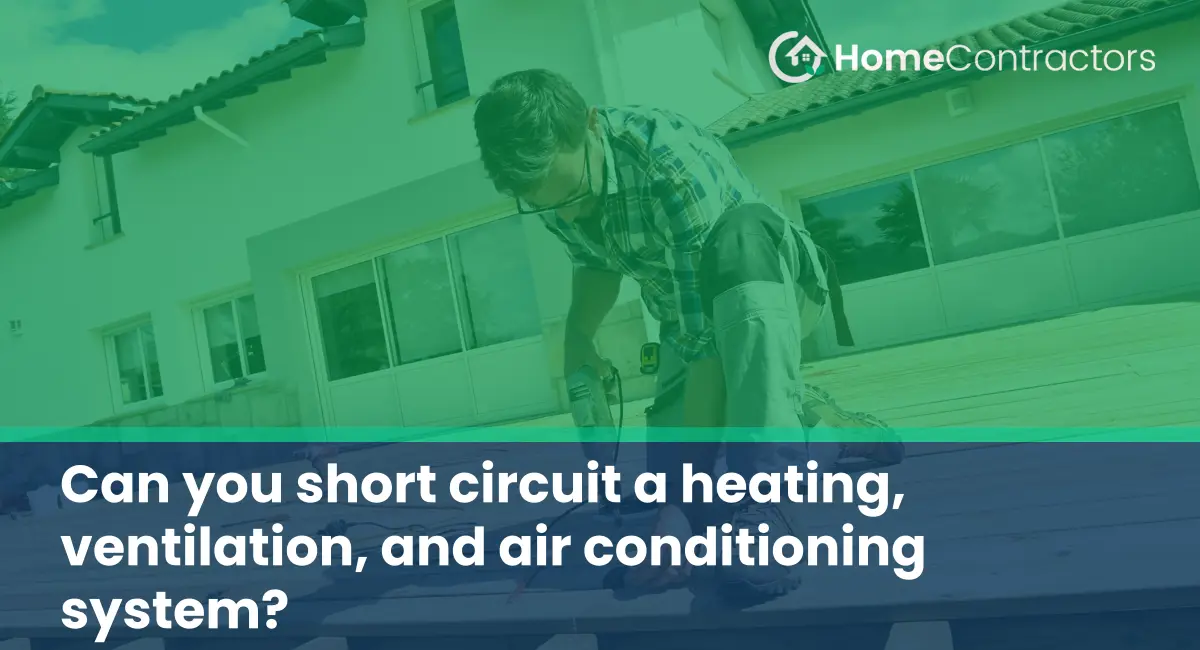Heating, ventilation, and air conditioning (HVAC) systems are crucial for maintaining a comfortable indoor environment. However, accidents and mishaps may occur, leading to concerns about short circuiting the HVAC system. In this article, we will delve into the topic of whether it is possible to short circuit an HVAC system and explore the potential consequences.
Understanding HVAV Systems
Before delving into the possibility of short-circuiting an HVAC system, let’s briefly understand how these systems operate and their components.
1. Heating System:
The heating component of an HVAC system usually consists of a furnace, heat pump, or boiler. It generates heat by burning fuel or using electricity, which is then distributed through the house via ductwork.
2. Ventilation System:
The ventilation system exchanges the air inside a building with fresh outdoor air. It incorporates air filters to remove dust, pollen, and other impurities. Additionally, it includes exhaust fans that help eliminate odors and moisture buildup.
3. Air Conditioning System:
The air conditioning component of an HVAC system cools the indoor environment during hot weather. It utilizes a compressor to circulate refrigerant, which extracts heat from the air and transfers it outside.
The Potential for Short Circuits
A short circuit occurs when an electrical current deviates from its intended path due to a low-resistance connection, such as a wire touching another wire or a conductive part of the HVAC system. While such events are uncommon in well-designed and properly installed systems, they can still occur under certain circumstances.
1. Causes of Short Circuits:
Short circuits in HVAC systems can be caused by various factors, including faulty wiring, damaged or exposed wires, loose connections, defective components, or excessive power surges. These issues can arise from poor installation practices, wear and tear, or power fluctuations.
2. Role of Overcurrent Protection:
To safeguard against short circuits, HVAC systems are equipped with overcurrent protection devices such as circuit breakers or fuses. These devices automatically interrupt the electrical supply to the system when they detect an abnormal current flow. They act as a safety mechanism to prevent damage or fire hazards.
Consequences of Short Circuiting an HVAC System
A short circuit in an HVAC system can have several detrimental consequences, impacting both the system’s functionality and safety.
1. Malfunctioning Equipment:
When a short circuit occurs, it can cause immediate system failure, rendering the HVAC system non-operational. Components such as the thermostat, control board, motors, or compressors may sustain damage or cease to function correctly.
2. Fire Hazards:
Short circuits have the potential to generate excessive heat or sparks, which can ignite nearby flammable materials or insulation. This poses a severe fire hazard and can lead to extensive property damage or even endanger the occupants.
3. Safety Risks:
In addition to fire hazards, short circuits can pose a risk of electric shock to anyone in contact with the system. High-voltage electrical currents flowing through exposed components may result in severe injury or electrocution.
Prevention and Maintenance
To minimize the risk of short circuits in HVAC systems and ensure their proper functioning, regular maintenance and adherence to safety protocols are crucial.
1. Professional Installation:
Having your HVAC system installed by experienced professionals helps ensure that the wiring and components are correctly installed according to industry standards. Proper grounding and thorough electrical inspections during installation are vital.
2. Routine Maintenance:
Regular maintenance, including inspections, cleaning, and replacing worn-out parts, plays a vital role in ensuring the HVAC system remains in safe and optimal working condition. This practice helps mitigate the risk of short circuits caused by deteriorated wiring or damaged components.
3. Professional Troubleshooting:
At the first sign of an electrical issue or malfunction in the HVAC system, it is advisable to contact a qualified technician to diagnose and resolve the problem. Attempting amateur repairs or tampering with the system’s electrical components without adequate knowledge can increase the risk of accidents and further damage.
While it is possible to short circuit an HVAC system, these occurrences are relatively rare in well-maintained systems. However, the potential consequences of a short circuit can be severe, ranging from equipment damage and system failure to fire hazards and safety risks. Adhering to professional installation practices, routine maintenance, and promptly addressing electrical issues can significantly minimize the risk of short circuiting, ensuring a safe and efficient HVAC system operation.
